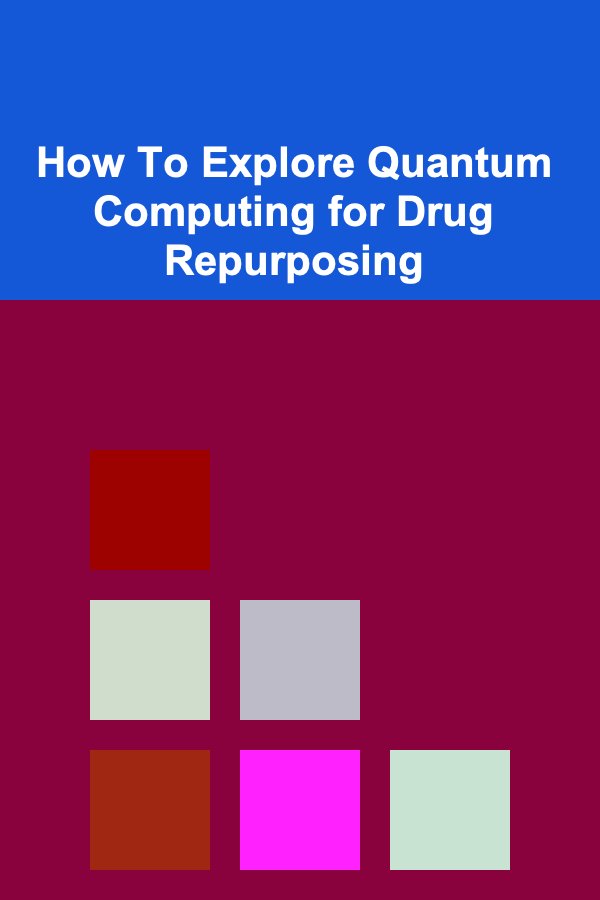
How To Explore Quantum Computing for Drug Repurposing
ebook include PDF & Audio bundle (Micro Guide)
$12.99$5.99
Limited Time Offer! Order within the next:

The field of drug discovery is one of the most challenging and intricate branches of pharmaceutical science. The quest for developing new therapeutics is a long, expensive, and often uncertain journey. However, recent advancements in computational methods have provided new avenues to accelerate the discovery process. One of the most groundbreaking developments is the advent of quantum computing , which holds the potential to revolutionize drug discovery, particularly in the field of drug repurposing.
What Is Quantum Computing?
Before diving into how quantum computing can be utilized in drug repurposing, it's essential to first understand what quantum computing is and how it differs from classical computing. Classical computers, which are based on binary bits, operate by encoding information as either a 0 or 1. This binary approach limits the complexity of certain calculations, especially when dealing with vast amounts of data or problems that involve intricate molecular structures.
Quantum computers, on the other hand, utilize quantum bits or qubits , which can exist in multiple states simultaneously due to quantum superposition. This enables quantum computers to perform complex calculations exponentially faster than classical systems. Quantum computing leverages principles like entanglement , where qubits can be interconnected, and superposition, where qubits can represent multiple combinations of states at once.
These unique properties of quantum computing can potentially be harnessed to solve problems that are currently computationally infeasible, such as simulating complex molecular systems, optimizing drug-target interactions, and identifying new uses for existing drugs. This is where the concept of drug repurposing comes into play.
What Is Drug Repurposing?
Drug repurposing (or drug repositioning) is the process of identifying new therapeutic uses for existing drugs. This approach can drastically reduce the time and cost required to bring a new drug to market. Instead of developing a drug from scratch, researchers focus on drugs that have already been tested for safety in humans, which can potentially bypass some of the early stages of the drug development pipeline.
Historically, drug repurposing has been employed with success in various cases. For instance, thalidomide , originally marketed as a sedative, was repurposed to treat multiple myeloma and leprosy. Another example is sildenafil (Viagra), which was initially tested for hypertension but found to have a beneficial effect on erectile dysfunction.
However, despite its advantages, drug repurposing can be a slow and labor-intensive process. The challenge lies in identifying the right drugs for the right conditions, which is where computational tools like machine learning and quantum computing could offer significant breakthroughs.
How Can Quantum Computing Accelerate Drug Repurposing?
Quantum computing offers several ways to revolutionize the field of drug repurposing, particularly in accelerating the drug discovery process. Here are some of the primary ways in which quantum computing can contribute:
1. Accelerating Molecular Simulations
One of the greatest challenges in drug discovery is the need to simulate molecular interactions accurately and efficiently. Classical computers can simulate small molecules and drug-receptor interactions, but as the size and complexity of the system increase, the computational resources required grow exponentially.
Quantum computers have the potential to simulate complex molecules with far greater accuracy and speed than classical systems. By leveraging quantum algorithms like the Quantum Approximate Optimization Algorithm (QAOA) and the Variational Quantum Eigensolver (VQE), quantum computers can simulate molecular dynamics and interactions at a level of detail that was previously unattainable.
This ability to simulate molecular interactions in real-time could help researchers quickly assess how a drug might interact with various biological targets, a crucial step in drug repurposing. Moreover, quantum computers could provide insights into the molecular structure of proteins and other biomolecules, enabling the identification of new targets for repurposing existing drugs.
2. Optimizing Drug-Target Interactions
Drug development heavily relies on optimizing the interaction between a drug and its target. This requires understanding how a drug binds to a protein or receptor and how that interaction affects the biological system. Classical methods, such as docking simulations and molecular dynamics simulations, are limited in their ability to account for the full range of interactions that occur at the quantum level.
Quantum computing can offer more accurate predictions of how drugs bind to targets. For example, quantum-enhanced machine learning could be used to improve the accuracy of docking simulations by training quantum algorithms to predict the optimal binding sites of drugs on proteins or other biomolecular targets. This could speed up the process of identifying new drug-target interactions that could be exploited for repurposing existing drugs.
3. Analyzing Large-Scale Data Sets
Another promising application of quantum computing in drug repurposing is its ability to handle large-scale data sets. Drug repurposing often requires analyzing vast amounts of biological, chemical, and clinical data to identify potential drug-disease pairs. Machine learning algorithms, when applied to these large data sets, can uncover patterns and relationships that might otherwise go unnoticed.
Quantum computers, with their ability to process exponentially more data than classical systems, could vastly improve the efficiency of these analyses. Quantum-enhanced machine learning techniques could help researchers identify which existing drugs are most likely to work for a given disease, based on the molecular and clinical data available.
4. Quantum-Based Chemoinformatics
Chemoinformatics involves the use of computational techniques to analyze and interpret chemical data, such as the structure-activity relationship (SAR) of molecules. One of the challenges in chemoinformatics is finding the best way to represent the vast chemical space of potential molecules, especially when working with large datasets.
Quantum computing could improve chemoinformatics by providing more accurate models for molecular structure, reactivity, and interactions. By simulating the electronic properties of molecules at the quantum level, researchers could gain deeper insights into the molecular characteristics that determine a drug's effectiveness. This could facilitate the identification of existing drugs with properties that make them suitable candidates for repurposing.
5. Solving Optimization Problems
In drug repurposing, there are numerous optimization problems that need to be solved, such as selecting the best drug candidates, optimizing drug dosages, and determining the most effective treatment regimens. Quantum computers excel at solving optimization problems due to their ability to explore large solution spaces simultaneously.
For example, quantum algorithms could be used to optimize clinical trial designs, helping researchers select the most promising drug-disease pairs for further testing. Additionally, quantum computing could be used to fine-tune drug dosing strategies, ensuring that patients receive the optimal amount of a repurposed drug for maximum therapeutic benefit.
Challenges and Limitations
While the potential of quantum computing for drug repurposing is immense, there are several challenges and limitations to consider. Quantum computing is still in its infancy, and many of the algorithms and hardware necessary for drug discovery are still being developed.
1. Quantum Hardware Limitations
Current quantum computers are limited in terms of the number of qubits they can process, and these qubits are often prone to errors due to the fragile nature of quantum states. As a result, the practical applications of quantum computing in drug discovery are limited to relatively small molecular systems at present. Scaling quantum computers to handle larger and more complex systems will be a significant hurdle.
2. Integration with Classical Systems
Quantum computing does not replace classical computing but rather complements it. Researchers will need to develop hybrid systems that combine the strengths of classical and quantum computing. For example, quantum algorithms might be used for simulating molecular dynamics, while classical systems could handle data processing and machine learning tasks. Integrating these two systems seamlessly will require significant technical expertise and innovation.
3. Data Availability and Quality
The success of drug repurposing efforts using quantum computing will depend on the quality and availability of the data used to train quantum algorithms. Drug-repurposing databases are often fragmented, and there may be inconsistencies in the data available for various diseases and drugs. Ensuring that high-quality, well-curated datasets are available for quantum-enhanced analyses will be crucial for the success of quantum computing in this field.
Conclusion
Quantum computing holds the potential to revolutionize drug repurposing by providing tools to simulate molecular interactions, optimize drug-target binding, analyze large-scale data sets, and solve complex optimization problems. While the technology is still in its early stages, its future applications in drug discovery are incredibly promising. As quantum computing continues to evolve, it could significantly reduce the time and cost of bringing new therapies to market, making it a valuable tool for drug repurposing efforts. However, addressing the challenges of quantum hardware limitations, integration with classical systems, and data quality will be critical to fully realizing its potential in the pharmaceutical industry.
By exploring and harnessing the power of quantum computing, researchers could unlock new possibilities in the fight against diseases, creating faster, more efficient pathways for repurposing existing drugs to treat a wide range of conditions.

How to Build a Profitable YouTube Channel About Travel
Read More
How to Create an Accessible Seasonal Clothing Rotation
Read More
How to Develop a Complete Home Camera System That Meets Your Needs
Read More
How to Make Money Online as a Music Composer: 10 Actionable Ideas
Read More
How to Save Money on Groceries Each Month
Read More
How to Use Wall Sconces for Elegant and Practical Lighting
Read MoreOther Products

How to Build a Profitable YouTube Channel About Travel
Read More
How to Create an Accessible Seasonal Clothing Rotation
Read More
How to Develop a Complete Home Camera System That Meets Your Needs
Read More
How to Make Money Online as a Music Composer: 10 Actionable Ideas
Read More
How to Save Money on Groceries Each Month
Read More